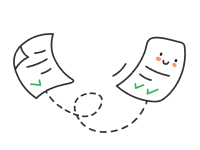Since the beginning of the full-scale war, the state has implemented changes in the legislation that mitigate tax audits. According to Law No. 2120-ІХ dated March 15, 2023, only certain types of tax audits are allowed during martial law, namely, actual, desk and documentary unscheduled tax audits.
The state has imposed a moratorium on other types of tax audits during martial law. This is stipulated by Article 38.11 of the Tax Code. Currently, the Verkhovna Rada is considering draft law No. 8401, under which inspections may be partially restored for excisable goods, gambling industry and financial services.
The moratorium is still in effect, but businesses should be ready for audits in the near future. It is possible to submit documents for audit in paper or electronic form.
How do the tax authorities regard electronic documents?
Ukrainian legislation provides for the creation and circulation of primary documents in electronic form. Their legal force is defined in the Law of Ukraine “On Accounting and Financial Reporting in Ukraine”. The state authorities have also repeatedly provided clarifications regarding tax reporting in electronic form:
- letter of the State Tax Service of Ukraine No. 10406/7/18-4017;
- letter of the Ministry of Finance of Ukraine No. 31-34000-20-17/31818;
- letter of the State Fiscal Service of Ukraine No. 30/6/99-99-15-02-02-15 etc.
Therefore, it is not the form of the document that is important for the tax service, but its compliance with the current legislation i.e. the correct execution of business transactions and the presence of all the necessary details of the primary document, and so on.

What is the procedure for tax audits?
In the event of a documentary office audit, the taxpayer sends primary documents drawn up in electronic form to the STS. The procedure for submission of documents is defined in the Order of the Ministry of Finance No. 1393. Electronic documents together with their description can be transferred on a flash drive or other electronic carriers, as well as sent by email. Formats of electronic documents for tax audits are defined in Article 85 of the Tax Code of Ukraine.
After receiving the documents, the tax inspectorate decrypts them and checks the contents of the archive with the description. Verification of the integrity of the electronic document is done by checking the integrity of the QES (Art. 12 of the Law of Ukraine “On Electronic Documents and Electronic Document Workflow”). After that, the tax office sends a letter to the taxpayer confirming the receipt of electronic documents and processes them.
During field audits the inspector checks the documents directly at the enterprise. As practice shows, first he studies the organization of document workflow in the company. This allows him to detect inconsistencies in the documents. Then the inspector examines documents relating to specific operations, counterparties, etc.
In such cases, e-document workflow services enable a company employee to quickly find the required document in the archive and provide it to the inspector. The timeframe for working with documents during an inspection is significantly reduced, and the risk of losing a document is minimized.
Please note! The tax inspector may require a paper copy if he does not have the technical ability to view the contents of the document. Therefore, in cases where the inspector checks electronic documents during the documentary audit at the company, it is necessary to provide him with a workplace with the necessary software and Internet access. The latter is necessary to check the validity of electronic signatures on documents.
The control body shall submit a request for copies of documents no later than five working days before the date of completion of the audit (par. 85.4 of Art. 85 of the TCU).
After the audit of documents is completed, the inspector draws up an act of tax audit (in case of identified violations) or a certificate (if there are no violations). For electronic audits only the certificate is drawn up. The inspector gives these documents to the taxpayer personally or sends them by mail.
The material is co-authored by:
Olena Serkyz, Chief Accountant, Vchasno;
Oleksandr Melnyk, Head of Legal Department, Zakúpki, Vchasno.






